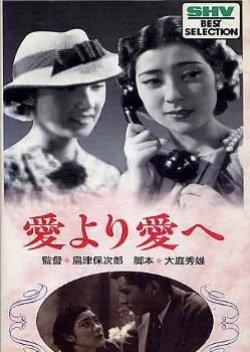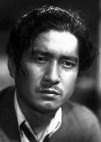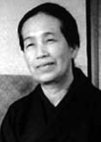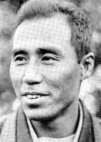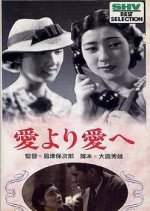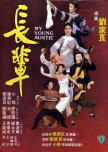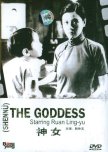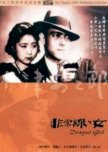Shigeo is a struggling writer (is there any other kind?) who moves in with his girlfriend after his family opposes their marriage. Miyako, a cafe waitress, tries to support them both, but Shigeo's family is intent on destroying their relationship. With all the odds stacked against them, Miyako must finally decide between love and logic. A modernist melodrama filled with period Tokyo landmarks like Ginza department stores and art deco architecture, its influence can even be found in Ozu's "Equinox Flower (Source: Chi Meng YouTube) Edit Translation
- English
- magyar / magyar nyelv
- dansk
- Norsk
- Native Title: 愛より愛へ
- Also Known As: Ai Tori Ai e
- Director: Shimazu Yasujiro
- Screenwriter: Ohba Hideo
- Genres: Romance
Cast & Credits
- Sano ShujiTanikawa ShigeoMain Role
- Takasugi SanaeMiyakoMain Role
- Katsuragi Fumiko[Shigeo's mother]Support Role
- Nodera Shoichi Support Role
- Mizushima Ryotaro[Shigeo's father]Support Role
- Takamine MiekoToshiko [Shigeo's sister]Support Role
Reviews

This review may contain spoilers
So Goes My Love is a short, sweet, predictable love story, but that doesn't mean it was bad. Just short, sweet, and predictable. Shigeo and Miyako have fallen in love and moved in together, against his father's wishes. Being the first born son and heir and stubbornly choosing his own mate has gotten him disowned by his traditional father. Shigeo doesn't care, he's willing to rough it as he works on his novel while Miyako works as a hostess at a nice café. It doesn't take long for him to realize that writing is hard and living takes money. He berates himself for being a loser and Miyako for loving such a loser.
Shigeo's sister, Toshiko, comes along to break up the monotony by giving them a surprise visit as she wonders at the lower classes. Miyako treats her with respect and kindness, despite the sudden visit as she is readying for work. Toshiko takes one look around and realizes this woman is no gold-digger but someone who would be a good wife for her churlish brother.
Shigeo visits his uncle to try and find work, but his meddlesome uncle creates more problems for him. One by one the family members are won over by Miyako's kindness and sincerity, but will it be enough to break through the patriarch's stone heart?
Many of the problems in this story were created by the collision of traditional and modern values as well as generational conflicts. There was also the issue of the prideful male egos at play. As the heir, Shigeo had bucked tradition and chosen his own mate, something his father seemingly could not accept.
As with many films from this era there was a mix of traditional and Western dress and furniture. Toshiko took the couple out to a German movie which Shigeo walked out of. It made me wonder if the director’s personal beliefs bled through about this turbulent political time.
Most of the acting was natural and believable. Takasugi Sanae gave a gentle performance as the kind and hard-working Miyako. Takamine Mieko as the vivacious sister provided just the right spark as the bridge between the couple and Shigeo’s family and a cheerleader for the lovers.
The only drawbacks for me were the cold father and son, with few words of encouragement for anyone. I wondered what Miyako saw in Shigeo. We come into the story with his male pride damaged by not having the skills to write and unable to find a job while Miyako goes off every night to work. Despite their differences the couple deeply loved each other.
Even with Shigeo’s occasional rude behavior, typical of so many cold male leads, I enjoyed this short, simple romance. It didn’t explore any new territory and didn’t delve deeply into societal or relationship woes, it was just a straightforward story of a boy and a girl who have to decide if the struggle and their love are worth the pain.
11/12/22
Was this review helpful to you?
Recommendations
There have been no recommendations submitted. Be the first and add one.

